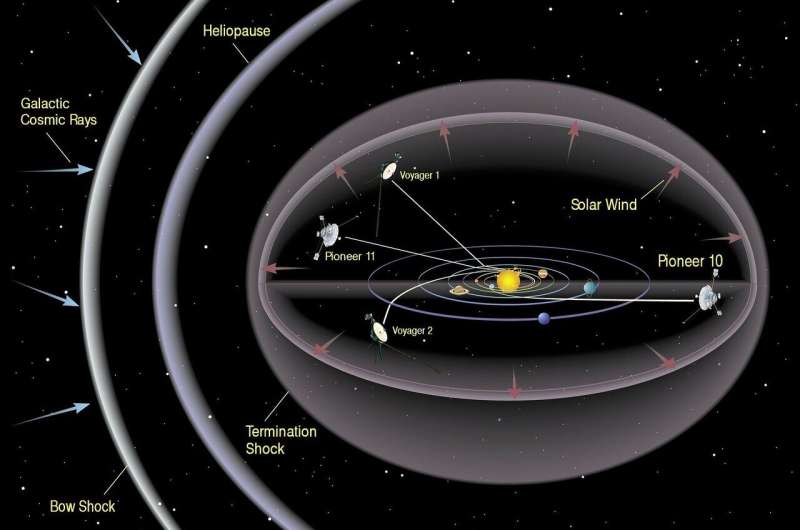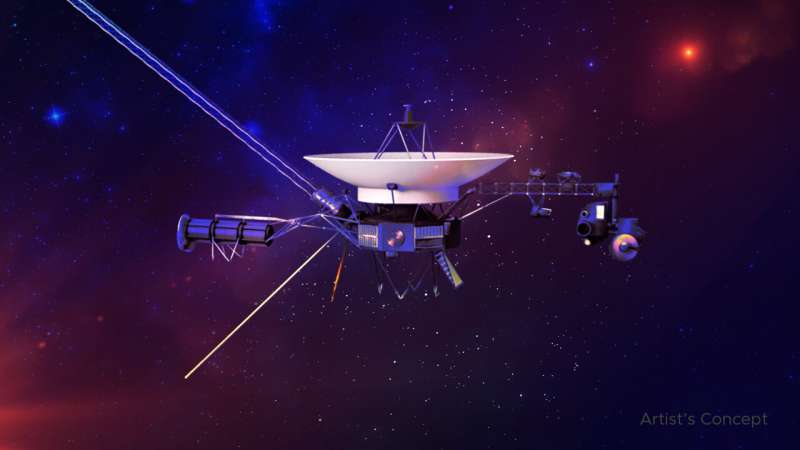Immune System Changes During Space Travel Could Affect Aging on Earth
Monday, 17 June 2024 05:08 As long as humans have been traveling into space, astronauts have experienced significant health effects from the extreme conditions of space flight, notably the reduction of gravity.
Two Buck scientists led a team that has revealed for the first time how the lack of gravity affects the cells of the immune system at single cell resolution. As co-senior authors, along with Christopher E. Ma
As long as humans have been traveling into space, astronauts have experienced significant health effects from the extreme conditions of space flight, notably the reduction of gravity.
Two Buck scientists led a team that has revealed for the first time how the lack of gravity affects the cells of the immune system at single cell resolution. As co-senior authors, along with Christopher E. Ma Origins of fast radio bursts examined using polarized light
Monday, 17 June 2024 05:08 What scientists previously thought about where Fast Radio Bursts (FRBs) come from is just the tip of the iceberg, according to new research led by astronomers at the University of Toronto. The mysteries of the millisecond-long cosmic explosions are unfolding with a new way of analyzing data from the Canadian Hydrogen Intensity Mapping Experiment (CHIME).
Published today in The Astrophysica
What scientists previously thought about where Fast Radio Bursts (FRBs) come from is just the tip of the iceberg, according to new research led by astronomers at the University of Toronto. The mysteries of the millisecond-long cosmic explosions are unfolding with a new way of analyzing data from the Canadian Hydrogen Intensity Mapping Experiment (CHIME).
Published today in The Astrophysica EU puts digital Earth in orbit for climate-change fight
Monday, 17 June 2024 05:08 A software model of Earth, meant to simulate and monitor environmental hazards while findings ways to mitigate climate change, began its monitoring and predictive mission on Monday, the EU Commission said.
The Destination Earth initiative resulted in a digital model of the planet to simulate natural phenomena by utilising an "unprecedented amount of data", according to its website.
The m
A software model of Earth, meant to simulate and monitor environmental hazards while findings ways to mitigate climate change, began its monitoring and predictive mission on Monday, the EU Commission said.
The Destination Earth initiative resulted in a digital model of the planet to simulate natural phenomena by utilising an "unprecedented amount of data", according to its website.
The m New Database to Improve Astronaut Health Could Benefit Earthlings
Monday, 17 June 2024 05:08 As space travel becomes more frequent, a new biomarker tool was developed by an international team of researchers to help improve the growing field of aerospace medicine and the health of astronauts.
Dr. Guy Trudel (Professor in the Faculty of Medicine), Odette Laneuville (Associate Professor, Faculty of Science, and Director of the Biomedical Sciences) and Dr. Martin Pelchat (Associate Pr
As space travel becomes more frequent, a new biomarker tool was developed by an international team of researchers to help improve the growing field of aerospace medicine and the health of astronauts.
Dr. Guy Trudel (Professor in the Faculty of Medicine), Odette Laneuville (Associate Professor, Faculty of Science, and Director of the Biomedical Sciences) and Dr. Martin Pelchat (Associate Pr NASA's Voyager 1, the most distant spacecraft from Earth, is doing science again after problem
Saturday, 15 June 2024 13:40
NASA's Voyager 1, the most distant spacecraft from Earth, is sending science data again.
Voyager 1's four instruments are back in business after a computer problem in November, the Jet Propulsion Laboratory said this week. The team first received meaningful information again from Voyager 1 in April, and recently commanded it to start studying its environment again.
Launched in 1977, Voyager 1 is drifting through interstellar space, or the space between star systems. Before reaching this region, the spacecraft discovered a thin ring around Jupiter and several of Saturn's moons. Its instruments are designed to collect information about plasma waves, magnetic fields and particles.
Voyager 1 is over 15 billion miles (24.14 kilometers) from Earth. Its twin Voyager 2—also in interstellar space—is more than 12 billion miles (19.31 kilometers) miles away.
© 2024 The Associated Press. All rights reserved. This material may not be published, broadcast, rewritten or redistributed without permission.
Senate Armed Services Committee advances 2025 defense policy bill
Saturday, 15 June 2024 09:04

Frenchman found dead at Russia's Baikonur cosmodrome
Saturday, 15 June 2024 07:59 A Frenchman has died apparently of dehydration after illegally entering the territory of Russia's Baikonur space base in Kazakhstan for "extreme" tourism, officials said this week.
"Our embassy... has been informed of the death of a French tourist. It has been mobilised to offer support to his family," a diplomatic source told AFP on Thursday, two days after Russian authorities announced the
A Frenchman has died apparently of dehydration after illegally entering the territory of Russia's Baikonur space base in Kazakhstan for "extreme" tourism, officials said this week.
"Our embassy... has been informed of the death of a French tourist. It has been mobilised to offer support to his family," a diplomatic source told AFP on Thursday, two days after Russian authorities announced the NASA says 'emergency' audio from ISS was simulation exercise
Saturday, 15 June 2024 07:59 NASA said that audio indicating distress over a sick crew member on the International Space Station Wednesday was part of a simulation exercise.
NASA said there was "no emergency situation going on aboard the International Space Station" in a post on the ISS X account.
"At approximately 5:28 p.m. CDT, audio was aired on the NASA livestream from a simulation audio channel on the g
NASA said that audio indicating distress over a sick crew member on the International Space Station Wednesday was part of a simulation exercise.
NASA said there was "no emergency situation going on aboard the International Space Station" in a post on the ISS X account.
"At approximately 5:28 p.m. CDT, audio was aired on the NASA livestream from a simulation audio channel on the g NASA cancels ISS spacewalk after 'spacesuit discomfort'
Saturday, 15 June 2024 07:59 NASA called off a spacewalk Thursday morning at the International Space Station because of an issue with one of the space suits, officials said.
Astronauts Tracy C. Dyson and Matt Dominick were in their suits and set to step out of the ISS when the mission was scrubbed.
"The spacewalk today, June 13, at the International Space Station, did not proceed as scheduled due to a spaces
NASA called off a spacewalk Thursday morning at the International Space Station because of an issue with one of the space suits, officials said.
Astronauts Tracy C. Dyson and Matt Dominick were in their suits and set to step out of the ISS when the mission was scrubbed.
"The spacewalk today, June 13, at the International Space Station, did not proceed as scheduled due to a spaces NASA delays return of Starliner astronauts from space station
Saturday, 15 June 2024 07:59 Starliner's return to Earth is now delayed to June 22 or later, NASA announced Friday.
NASA astronauts Butch Wilmore and Suni Williams, who embarked on the long-awaited Boeing Starliner mission June 5 and docked at the International Space Station the following day, will have to spend a little more time in orbit than originally planned.
Both astronauts were originally set to compl
Starliner's return to Earth is now delayed to June 22 or later, NASA announced Friday.
NASA astronauts Butch Wilmore and Suni Williams, who embarked on the long-awaited Boeing Starliner mission June 5 and docked at the International Space Station the following day, will have to spend a little more time in orbit than originally planned.
Both astronauts were originally set to compl Ovzon’s first broadband satellite reaches geostationary slot
Friday, 14 June 2024 20:10

Voyager 1 returning science data from all four instruments
Friday, 14 June 2024 15:45
NASA's Voyager 1 spacecraft is conducting normal science operations for the first time following a technical issue that arose in November 2023.
The team partially resolved the issue in April when they prompted the spacecraft to begin returning engineering data, which includes information about the health and status of the spacecraft. On May 19, the mission team executed the second step of that repair process and beamed a command to the spacecraft to begin returning science data.
Two of the four science instrumentsreturned to their normal operating modes immediately. Two other instruments required some additional work, but now, all four are returning usable science data.
The four instruments study plasma waves, magnetic fields, and particles. Voyager 1 and Voyager 2 are the only spacecraft to directly sample interstellar space, which is the region outside the heliosphere—the protective bubble of magnetic fields and solar wind created by the sun.
While Voyager 1 is back to conducting science, additional minor work is needed to clean up the effects of the issue.






